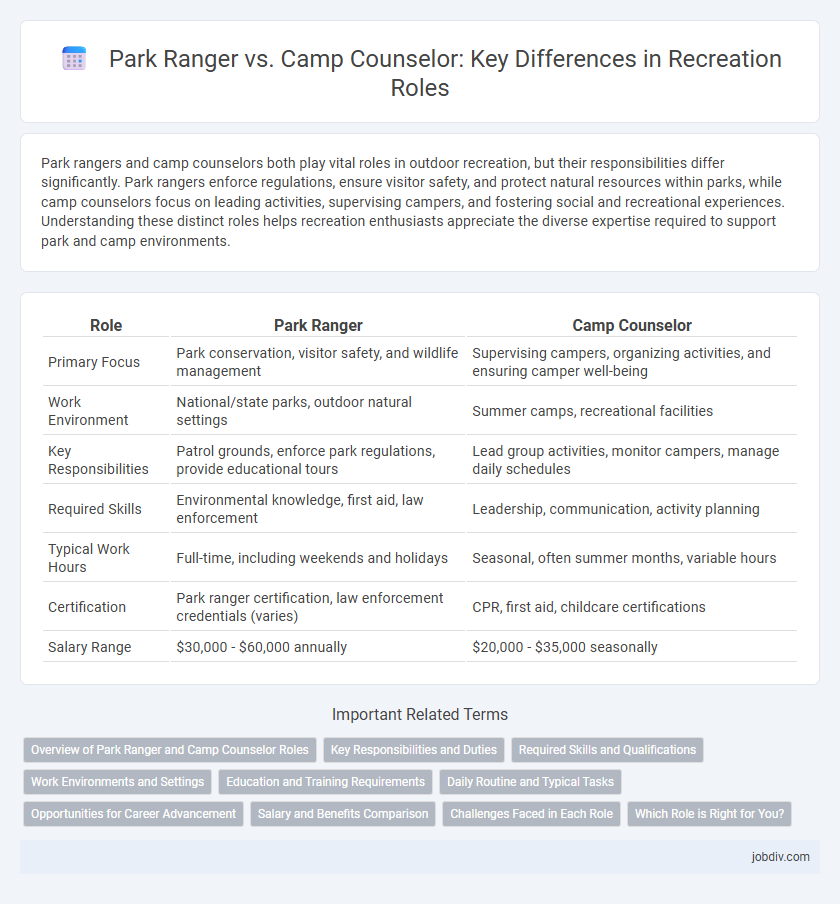Park rangers and camp counselors both play vital roles in outdoor recreation, but their responsibilities differ significantly. Park rangers enforce regulations, ensure visitor safety, and protect natural resources within parks, while camp counselors focus on leading activities, supervising campers, and fostering social and recreational experiences. Understanding these distinct roles helps recreation enthusiasts appreciate the diverse expertise required to support park and camp environments.
Table of Comparison
| Role | Park Ranger | Camp Counselor |
|---|---|---|
| Primary Focus | Park conservation, visitor safety, and wildlife management | Supervising campers, organizing activities, and ensuring camper well-being |
| Work Environment | National/state parks, outdoor natural settings | Summer camps, recreational facilities |
| Key Responsibilities | Patrol grounds, enforce park regulations, provide educational tours | Lead group activities, monitor campers, manage daily schedules |
| Required Skills | Environmental knowledge, first aid, law enforcement | Leadership, communication, activity planning |
| Typical Work Hours | Full-time, including weekends and holidays | Seasonal, often summer months, variable hours |
| Certification | Park ranger certification, law enforcement credentials (varies) | CPR, first aid, childcare certifications |
| Salary Range | $30,000 - $60,000 annually | $20,000 - $35,000 seasonally |
Overview of Park Ranger and Camp Counselor Roles
Park Rangers manage and protect natural resources within national or state parks, ensuring visitor safety, enforcing regulations, and providing educational programs about wildlife and conservation. Camp Counselors guide and supervise children or teenagers in recreational activities at camps, promoting teamwork, safety, and personal growth through structured programs. Both roles require strong communication and leadership skills but differ in settings and responsibilities, with Rangers emphasizing environmental stewardship and Counselors focusing on youth development.
Key Responsibilities and Duties
Park Rangers enforce conservation laws, manage visitor safety, and provide educational programs about natural resources. Camp Counselors supervise recreational activities, ensure camper well-being, and facilitate social development among youth. Both roles require strong communication skills, but Park Rangers emphasize environmental stewardship while Camp Counselors prioritize group leadership and activity coordination.
Required Skills and Qualifications
Park rangers require strong knowledge of environmental science, law enforcement skills, and first aid certification to ensure public safety and resource protection. Camp counselors must possess excellent communication, leadership, and conflict resolution abilities, along with CPR training to effectively manage group activities and emergencies. Both roles demand physical fitness, problem-solving skills, and experience in outdoor education or recreation management.
Work Environments and Settings
Park Rangers primarily work in national, state, or local parks, managing natural resources, ensuring visitor safety, and enforcing regulations in outdoor, wilderness settings. Camp Counselors operate within summer camps, recreational centers, or youth camps, providing supervision, organizing activities, and fostering camper engagement in a more structured, camp-based environment. Both roles require strong communication skills, but Park Rangers often face more physically demanding outdoor conditions compared to the socially focused, group-oriented settings of Camp Counselors.
Education and Training Requirements
Park Rangers typically require a bachelor's degree in fields such as natural resource management, environmental science, or forestry, combined with specialized training in law enforcement and emergency response. Camp Counselors generally need a high school diploma or equivalent, with additional certifications in CPR, first aid, and outdoor leadership often preferred to ensure camper safety and program effectiveness. Both roles benefit from hands-on experience and ongoing professional development to maintain skills relevant to recreation and public safety.
Daily Routine and Typical Tasks
Park Rangers conduct regular patrols to ensure safety, monitor wildlife, and maintain park facilities, while Camp Counselors focus on organizing activities, supervising campers, and fostering a positive group environment. Rangers handle emergency situations and enforce park regulations, whereas Counselors plan educational programs and lead recreational events. Both roles require strong communication skills, but Rangers emphasize law enforcement and conservation, while Counselors prioritize child supervision and activity coordination.
Opportunities for Career Advancement
Park rangers have diverse career advancement opportunities through specialized certifications, leadership roles in conservation projects, and federal agency promotions. Camp counselors can progress to senior counselor positions, program directors, or roles in recreational management and youth services administration. Both careers offer pathways to expanded responsibilities, but park rangers often access broader governmental career ladders and specialized training programs.
Salary and Benefits Comparison
Park rangers typically earn a median annual salary of around $45,000 to $60,000, with benefits including health insurance, retirement plans, and paid leave provided by government agencies. Camp counselors often receive lower wages, averaging $20,000 to $30,000 annually, with fewer or variable benefits depending on seasonal or private camp employment. Compensation packages for park rangers generally offer greater job stability and comprehensive benefits compared to the often seasonal and less consistent pay and benefits of camp counselors.
Challenges Faced in Each Role
Park rangers often confront challenges such as managing wildlife conservation, enforcing safety regulations, and handling emergency rescues in remote areas. Camp counselors face the difficulty of supervising diverse groups of children, resolving conflicts, and organizing engaging activities while ensuring a safe and inclusive environment. Both roles require adaptability, strong communication skills, and the ability to handle unexpected situations under pressure.
Which Role is Right for You?
Park Rangers manage natural resources and ensure visitor safety in parks, requiring strong knowledge of wildlife, emergency response skills, and law enforcement abilities. Camp Counselors focus on supervising and engaging children in recreational activities, emphasizing leadership, communication, and childcare experience. Choosing between the two depends on your passion for environmental stewardship versus interactive youth mentorship.
Park Ranger vs Camp Counselor Infographic

 jobdiv.com
jobdiv.com